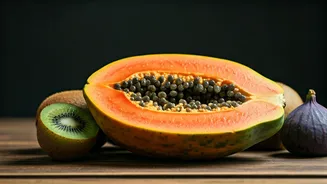Understanding Constipation Relief
Constipation, a common ailment, can be effectively managed and alleviated through dietary adjustments. This article highlights a selection of foods recommended
by a Harvard-trained gastroenterologist, offering a natural approach to relieve constipation. Each food has properties that assist in improving digestion and promoting regular bowel movements. Implementing these foods into your diet could provide significant benefits, offering a holistic path to better digestive health and comfort. The expert guidance focuses on easily accessible and practical dietary modifications, empowering individuals to take control of their digestive well-being through informed choices.
Fiber-Rich Foods: Overview
Fiber stands out as a critical element in the fight against constipation. Foods rich in fiber, like fruits, vegetables, and whole grains, contribute significantly to digestive health. Fiber acts by adding bulk to stools, making them easier to pass and alleviating strain on the intestines. Increased fiber intake also stimulates peristalsis, the muscle contractions that move food through the digestive tract. It's recommended that individuals increase their fiber consumption gradually to avoid discomfort. This gradual increase allows the digestive system to adapt. Focusing on high-fiber foods becomes a key element in maintaining regular bowel movements and improving overall gut health.
Prunes: Nature's Laxative
Prunes are well-known for their natural laxative properties and are a powerful weapon against constipation. Their effectiveness stems from a high fiber content, which adds bulk to stools, facilitating easier passage. Prunes also contain sorbitol, a sugar alcohol that draws water into the intestines, softening the stool. The combination of fiber and sorbitol makes prunes highly effective for constipation relief. The consumption of prunes can be a simple yet potent strategy for improving bowel regularity and ensuring smoother digestion. Including prunes in your diet can support a healthy and functional digestive system.
Apples and Pears
Apples and pears are beneficial for gut health due to their fiber content and natural sugars. These fruits are rich sources of soluble fiber, which forms a gel-like substance in the digestive tract and aids in stool softening. Additionally, both fruits provide natural sugars like fructose, which, in moderation, can gently stimulate bowel movements. Apples and pears offer a palatable and easily accessible method for enhancing digestive function. Eating apples and pears regularly can improve digestive comfort and help prevent constipation. It's essential to consume these fruits as part of a balanced diet to leverage their benefits fully and improve digestive health.
Kiwi: Gut-Friendly Fruit
Kiwis are a nutritional powerhouse and a great ally in the fight against constipation. They contain both soluble and insoluble fiber, which work synergistically to support bowel regularity. The fiber in kiwis increases stool bulk and accelerates transit through the intestines. Moreover, kiwis also contain an enzyme called actinidin, which aids in protein digestion and enhances gut motility. Regularly incorporating kiwis into your diet can lead to improved bowel function and overall digestive wellness. Kiwis provide a flavorful and convenient way to address and prevent the discomfort associated with constipation.
Beans and Legumes
Beans and legumes are indispensable for digestive health, thanks to their remarkable fiber content. This food group includes options such as lentils, chickpeas, and various types of beans, each packed with substantial amounts of dietary fiber. The fiber in these foods adds bulk to stools, easing their passage through the digestive system. In addition to fiber, beans and legumes offer a wealth of nutrients, including proteins and essential minerals, which further support overall health and wellness. Regularly adding beans and legumes to your diet can significantly improve bowel regularity and aid in preventing constipation. These foods also contribute to a balanced diet, fostering long-term digestive and systemic health.
Spinach: Leafy Aid
Spinach is a leafy green that delivers both fiber and essential nutrients, contributing to its role in digestive health. This dark, leafy vegetable is a good source of fiber, which helps to increase stool bulk and promotes smoother bowel movements. In addition to fiber, spinach contains magnesium, a mineral that can relax the intestinal muscles, supporting easier bowel transit. Consuming spinach regularly can assist in alleviating constipation and keeping the digestive tract functioning smoothly. Spinach offers a versatile and nutritious option for those aiming to improve their digestive health.
Chia Seeds: Small but Mighty
Chia seeds, though small, are incredibly potent for digestive health, mainly due to their high fiber content. When mixed with water, chia seeds form a gel, which adds bulk to the stool and helps to soften it, thereby facilitating easy passage. This makes chia seeds a simple yet highly effective natural remedy for constipation. Furthermore, chia seeds are a great source of omega-3 fatty acids, which can help in reducing inflammation in the gut, thereby supporting overall digestive health. Including chia seeds in your diet is an easy way to promote regular bowel movements and support a healthy digestive system.
Flax Seeds: Fibre Powerhouse
Flax seeds are an excellent choice for improving digestive function, with their high fiber content being a key factor. Both soluble and insoluble fiber are present in flax seeds, working together to add bulk to stools and ease bowel movements. Regular consumption of flax seeds helps to keep the digestive tract moving smoothly, reducing the likelihood of constipation. Beyond their fiber content, flax seeds also contain omega-3 fatty acids, contributing to overall gut health by reducing inflammation. Adding flax seeds to your diet is a straightforward way to enhance digestion and maintain intestinal regularity, improving overall digestive comfort.
Whole Grains: Digestively Helpful
Whole grains, such as oats, brown rice, and quinoa, contribute significantly to digestive health due to their abundant fiber content. This fiber adds bulk to stools, facilitating smoother and more regular bowel movements. Moreover, whole grains contain essential nutrients that support overall gut health. Regularly including whole grains in your diet can effectively alleviate constipation and improve digestive comfort. Opting for whole grain alternatives over refined grains is a simple dietary change with significant positive effects. By embracing whole grains, one can enhance digestive health and promote a healthier, more balanced lifestyle.














